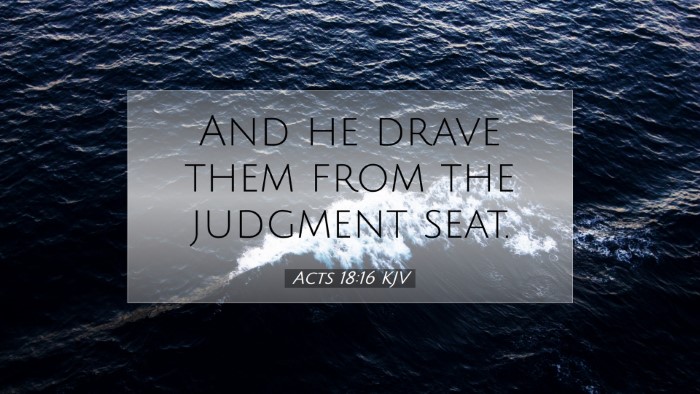Commentary on Acts 18:16
Acts 18:16 states, "And he drove them from the judgment seat." This verse occurs within the broader context of Paul’s ministry in Corinth, which is marked by opposition and legal challenges. Understanding the implications of this verse requires careful examination of its social, judicial, and theological dimensions.
Contextual Analysis
Matthew Henry’s Commentary emphasizes that this moment represents a turning point in Paul’s apostolic work in Corinth. The main actors are Paul, the Jewish community, and Gallio, the proconsul. Paul faced accusations from the Jews who sought to portray his teachings as a violation of Jewish law. However, Gallio’s dismissal of the case illuminates the burgeoning separation of Christianity from Judaism during this period.
Judicial Dismissal
According to Albert Barnes’ Notes on the New Testament, Gallio’s refusal to involve himself in what he deemed a religious dispute has far-reaching consequences. His statement reflects a critical moment in the early Christian church where political and religious boundaries began to diverge:
- Legal Implications: By dismissing the case, Gallio effectively protects Paul and Christians in Corinth from being persecuted under Jewish law.
- Cultural Shift: The ruling signifies a shift in the Roman Empire’s treatment of emerging sects, where the distinction between Judaism and Christianity is solidifying.
- Theological Reflection: The verse might be interpreted as God's providential care for Paul, as He orchestrates circumstances that enable the Apostle to continue his ministry unimpeded.
The Role of Leadership
Adam Clarke's Commentary notes that the reaction of Gallio is particularly poignant; it showcases the power of a secular authority in the context of faith. This raises substantial points for church leaders today:
- Leadership Styles: Gallio represents indifferent yet effective leadership that refrains from interference in matters that do not contravene civic peace.
- Church and State Relations: The passage invites reflection on the church’s relationship with government and underscores the idea that civil authorities, when operating within their jurisdiction, can support the peace and stability needed for religious expressions.
- Confronting Oppression: Pastors are encouraged to acknowledge when civic rights and protections come into play regarding their ministry activities, taking wisdom from Gallio’s example.
Applications for Modern Believers
The dismissal of charges against Paul serves as a spiritual lesson for contemporary believers:
- Perseverance in Ministry: Paul’s continued ministry in the face of opposition exemplifies steadfastness, encouraging modern believers to remain faithful even in challenging environments.
- Divine Sovereignty: The event underscores the theme of God’s sovereignty; despite human conspiracies and accusations, God’s purpose remains intact.
- Community Support: The support Paul receives from the local community highlights the necessity for believers to cultivate supportive environments within their churches.
Conclusion
Acts 18:16, through its portrayal of Gallio's judgment and its implications for early Christianity, opens up a profound discourse about authority, the judicial system, and the mission of the church. By reflecting on the comments of Henry, Barnes, and Clarke, we can draw meaningful applications for our own contexts as we navigate the intricate relationship between faith and governance. This verse encourages a deeper understanding of legal proceedings and the assurance that God remains sovereign over the affairs of men, guiding His church through various seasons of trial and triumph.


